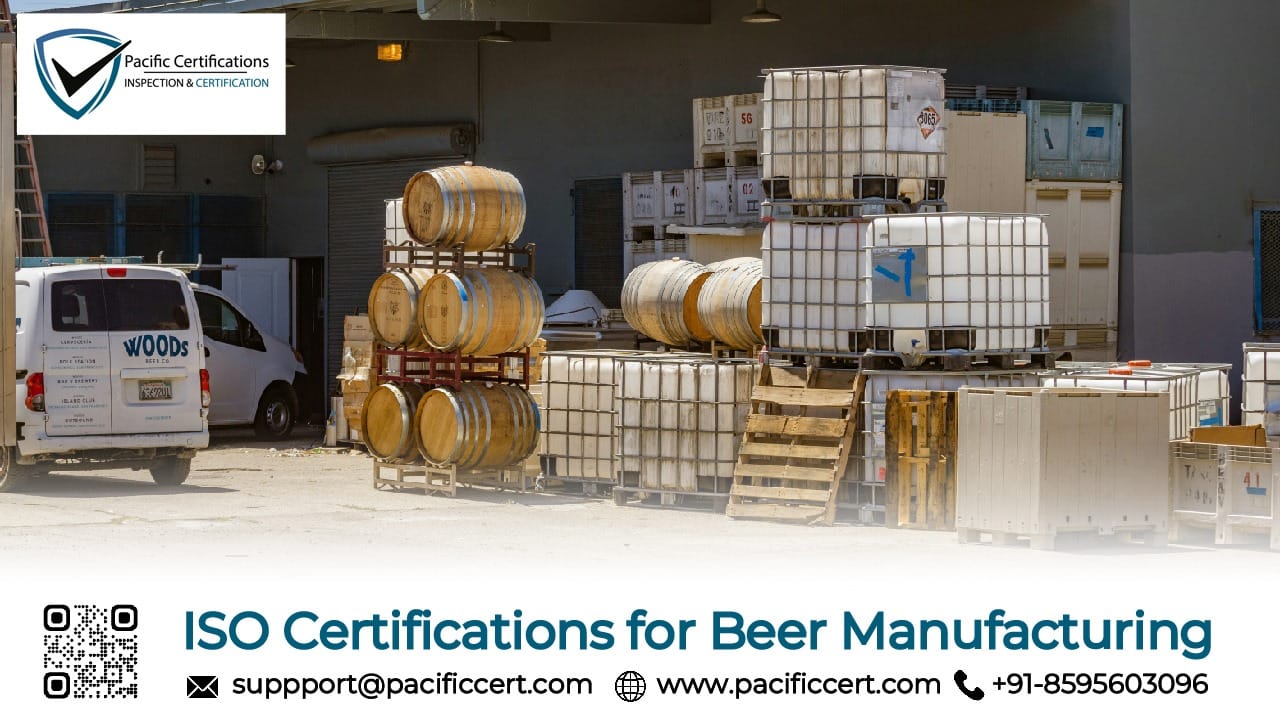ISO Certifications for Beer Manufacturing Businesses, Requirements and Benefits

Introduction
The global beer industry is evolving rapidly with growing competition, regulatory scrutiny, and consumer demand for consistent quality and sustainability. According to Fortune Business Insights, the beer market is projected to reach USD 1.3 trillion by 2030, driven by premiumization, craft breweries, and responsible production.
To stay competitive, breweries are increasingly adopting ISO certifications to standardize brewing processes, ensure food safety, reduce waste, and enhance product consistency.
A great beer starts with great systems — an ISO Certification ensures every batch is safe, consistent, and responsibly brewed— Pacific Certifications
If you need ISO certification for beer manufacturing, reach out to us at [email protected] for expert assistance!
Applicable ISO Standards for Beer Manufacturing
Various ISO standards apply to breweries, each focusing on different areas. Below are some of the most relevant certifications:
Standard | Description | Relevance |
|---|---|---|
ISO 22000 – Food Safety Management Systems (FSMS) | Establishes processes for identifying and controlling food safety hazards. | Ensures hygienic brewing, fermentation, bottling, and packaging to meet global safety standards. |
ISO 9001 – Quality Management Systems (QMS) | Provides a framework for consistent production and quality control. | Maintains batch-to-batch consistency, reduces defects, and improves customer satisfaction. |
ISO 14001 – Environmental Management Systems (EMS) | Focuses on sustainable practices, waste reduction, and pollution control. | Helps breweries manage water, wastewater, and packaging waste responsibly. |
ISO 45001 – Occupational Health & Safety Management Systems (OHSMS) | Defines procedures to prevent workplace accidents and injuries. | Protects brewery workers from chemical, machinery, and ergonomic hazards. |
ISO 50001 – Energy Management Systems (EnMS) | Optimizes energy efficiency across production processes. | Reduces energy use in brewing, refrigeration, and bottling, lowering operational costs. |
ISO 31000 – Risk Management Guidelines | Provides a framework for identifying and mitigating risks. | Addresses operational, supply chain, and product risks in brewery management. |
ISO/IEC 17025 – Testing & Calibration Laboratories | Sets requirements for testing accuracy and laboratory competence. | Ensures reliability in beer quality testing, alcohol content analysis, and microbiological checks. |
ISO 26000 – Social Responsibility | Promotes ethical practices, community engagement, and responsible marketing. | Supports responsible alcohol policies and sustainability initiatives. |
ISO 9001: Quality Management System
ISO 9001 ensures the brewery maintains consistent quality in all its operations. From raw material procurement to packaging, this standard promotes process optimization and customer satisfaction.
ISO 22000: Food Safety Management System
Beer, being a food product, must adhere to stringent safety standards. ISO 22000 ensures that food safety hazards are controlled throughout the brewing process—from sourcing raw ingredients to bottling. T
ISO 14001: Environmental Management System
Sustainability is becoming increasingly important in beer manufacturing. ISO 14001 helps breweries adopt eco-friendly practices, minimize waste, and reduce environmental impact.
ISO 45001: Occupational Health and Safety
Beer manufacturing involves several operational risks, including chemical exposure, accidents, and equipment handling. ISO 45001 ensures the brewery has effective occupational health and safety protocols, safeguarding the workforce and promoting a healthy workplace culture.
ISO 50001: Energy Management System
ISO 50001 enables breweries to monitor, manage, and improve energy consumption. This certification can reduce production costs while enhancing environmental performance, aligning with green brewing trends.
Click here to find out more applicable standards to your industry
What are the requirements of ISO Certifications for Beer Manufacturing?
Every ISO standard has its specific requirements. Here’s a breakdown of what breweries need to achieve compliance with major ISO certifications:
Generic Requirements (Applicable Across All Standards):
Policy & Objectives: Establish food safety, quality, environmental, and safety goals aligned with the brewery’s mission.
Risk Assessment: Identify potential risks related to contamination, production downtime, and workplace hazards.
Process Documentation: Maintain documented brewing procedures, cleaning protocols, and maintenance schedules.
Quality & Safety Controls: Implement HACCP principles, batch testing, and supplier quality verification.
Training & Competence: Train employees on hygiene, equipment handling, and emergency response.
Internal Audits: Conduct audits to verify compliance with ISO requirements and legal standards.
Management Review: Leadership reviews performance, incident reports, and customer feedback regularly.
Corrective & Preventive Actions: Address nonconformities and improve processes continuously.
Legal & Regulatory Compliance: Comply with food safety, labeling, excise, and environmental regulations.
Continuous Improvement: Use audit results and customer data to enhance process control and sustainability.
Specific requirements:
ISO 9001:2015 Requirements
- Develop documented procedures for key processes
- Establish measurable quality objectives
- Conduct regular internal audits and management reviews
- Ensure customer feedback is incorporated into improvements
ISO 22000 Requirements
- Implement a Hazard Analysis and Critical Control Points (HACCP) plan
- Conduct risk assessments throughout the supply chain
- Ensure effective traceability systems for ingredients and final products
- Train staff on food safety practices
ISO 14001 Requirements
- Assess and manage environmental impacts of brewing operations
- Develop sustainable resource management plans, such as water reuse strategies
- Set environmental goals and track progress through regular audits
- Ensure compliance with local environmental regulations
ISO 45001 Requirements
- Identify workplace hazards and implement preventive measures
- Establish emergency response plans
- Provide continuous employee training on safety protocols
- Promote a safety-first culture within the brewery
Tip: Start by integrating ISO 22000 and ISO 9001 into your brewing operations, these build the foundation for safety, consistency, and international market access.
For professional audit and certification services, contact us at [email protected]!
What are the benefits of ISO Certifications for Beer Manufacturing businesses?
Achieving ISO certifications offers numerous advantages to breweries. These benefits extend beyond regulatory compliance and market presence, below are the key benefits:
- Food Safety Assurance – ISO 22000 ensures contamination-free brewing, bottling, and distribution.
- Consistent Product Quality – ISO 9001 reduces process variation and enhances flavor consistency.
- Environmental Sustainability – ISO 14001 promotes responsible water use and waste management.
- Worker Safety – ISO 45001 reduces accident risks in handling chemicals, glass, and heavy machinery.
- Energy Efficiency – ISO 50001 helps breweries cut energy costs during refrigeration and fermentation.
- Risk Mitigation – ISO 31000 supports proactive identification of operational and supply chain risks.
- Accurate Laboratory Testing – ISO 17025 ensures reliable results in quality and alcohol content analysis.
- Compliance & Market Access – Certification meets buyer, regulatory, and export market requirements.
- Brand Reputation – ISO-certified breweries are trusted for transparency, sustainability, and quality.
- Customer Confidence – Builds trust with distributors, restaurants, and end consumers.
The global beer market is shifting toward premium, organic, and low-alcohol products, with sustainability and quality assurance driving purchasing decisions. Statista (2025) reports that over 70% of global breweries plan to implement or maintain ISO certifications by 2030 to meet international standards.
Adopting ISO 22000 and 14001 helps breweries comply with tightening food safety and environmental regulations, while ISO 50001 supports their transition toward carbon-neutral operations. ISO-certified beer manufacturers also report 30–40% fewer product recalls and higher export acceptance rates in markets like the EU and North America.
How Pacific Certifications Can Help
Pacific Certifications is accredited by ABIS, we provide independent audit and certification services for breweries and beverage manufacturers, our focus is on impartial, accredited certification recognized globally.
Pacific Certifications can help by:
- Conducting audits for ISO 22000, 9001, 14001, 45001, 50001 etc.
- Issuing internationally recognized ISO certificates for breweries and bottling units.
- Supporting integrated management system audits across multi-site brewing operations.
If you need support with ISO certification for your Beer Manufacturing business, please contact us at [email protected] or +91-8595603096.
Read More at: Blogs by Pacific Certifications
Author: Ashish

